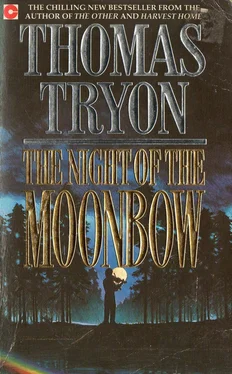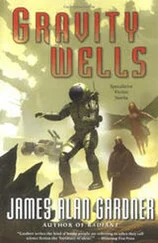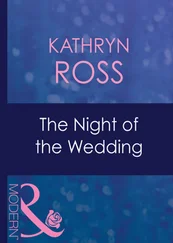Thomas Tryon - The Night of the Moonbow
Здесь есть возможность читать онлайн «Thomas Tryon - The Night of the Moonbow» весь текст электронной книги совершенно бесплатно (целиком полную версию без сокращений). В некоторых случаях можно слушать аудио, скачать через торрент в формате fb2 и присутствует краткое содержание. Жанр: Триллер, на английском языке. Описание произведения, (предисловие) а так же отзывы посетителей доступны на портале библиотеки ЛибКат.
- Название:The Night of the Moonbow
- Автор:
- Жанр:
- Год:неизвестен
- ISBN:нет данных
- Рейтинг книги:3 / 5. Голосов: 1
-
Избранное:Добавить в избранное
- Отзывы:
-
Ваша оценка:
- 60
- 1
- 2
- 3
- 4
- 5
The Night of the Moonbow: краткое содержание, описание и аннотация
Предлагаем к чтению аннотацию, описание, краткое содержание или предисловие (зависит от того, что написал сам автор книги «The Night of the Moonbow»). Если вы не нашли необходимую информацию о книге — напишите в комментариях, мы постараемся отыскать её.
The Night of the Moonbow — читать онлайн бесплатно полную книгу (весь текст) целиком
Ниже представлен текст книги, разбитый по страницам. Система сохранения места последней прочитанной страницы, позволяет с удобством читать онлайн бесплатно книгу «The Night of the Moonbow», без необходимости каждый раз заново искать на чём Вы остановились. Поставьте закладку, и сможете в любой момент перейти на страницу, на которой закончили чтение.
Интервал:
Закладка:
Thomas Tryon
The Night of the Moonbow
PART ONE: The New Boy
Prologue
Who, having heard it firsthand from the lips of Pa Star buck, could ever forget the famous tale of the moonbow? Who could account for its fatal charm, or explain of what singular enchantment the story was concocted? An aura it had, certainly; a unique kind of sorcery – but of what was it made? What caused it to happen? Why did it cast such a spell over everyone, this magical moonbow that no one at Moonbow Lake had ever seen?
In truth, until that fateful night when the last council fire was held in the pine grove, no one in that northeastern corner of Connecticut could recall ever having seen the spectacle, a silver rainbow of the night arched across the shimmering waters of the lake, a span of friendliness and Christian fellowship, as Pa described it, pointing up the moral of the Moonbow Tale.
Why, then, did the campers keep telling one another that one day, someday, the moonbow would appear? Perhaps they wished for it to be real because it gave them something to hope for; the moonbow was dreams come true, the impossible made possible, the infinite finite, a boy’s reward for being a boy. This summer it would come, they said, or this – or next, surely; wouldn’t it?
And when, in that final camp season of 1938, it did come, how was it possible that there, at Camp Friend-Indeed, where the summer sang among the trees, where no Moonbow boy had ever raised his hand against another, hatred,- rank and profound, should have shown its face? Someone with a bucket of paint and a brush should have daubed an X on the door of Cabin 7, the cabin called
Jeremiah, for it was there that the red-speckled death had first appeared, to pass among the boys, spreading contagion, until one by one it claimed them all, poor luckless boys of lucky Cabin 7.
What had it been? Some momentary moonbow madness? A bad dream? So Pa Starbuck often thought in those dolorous after-years when, having been relieved of his long tenure as founder-director of the camp, he had come to eke out what time the Almighty had allotted to him in a squalid, sun-parched suburb of Miami, where whichever neon moons that rose above the withered palm trees behind his stucco bungalow were merely the bitter reminders of his sorrows.
Perhaps it was only a dream, thought the Reverend wistfully, bathed in the silver glow of his Philco television screen, the kind of dream that is born of moonbow magic, gossamer and gone. He sighed again and told himself the Lord knew he had tried – He did, didn't He? – he had, hadn’t he?
The afternoon the new boy arrived, a scorcher for that early in July, the Red Sox were playing the Braves. Tiger Abernathy, captain and star catcher for the Sox, shouldered his Louisville Slugger and stepped on to the plate, tapped his bat, waited as the pitcher wound up and let fly, then took a mighty swing at the ball. Dusty Rhoades, the Braves’ first baseman, missed it altogether, and Oggie Ogden, the outfielder, leaning sideways with outstretched glove, also came up empty-handed, and there went the ball smack through the back window of Ma Starbuck’s office. A shattering of glass was briefly heard, then the victory cheer as Tiger beat it to home plate for his third run that afternoon.
Hap Holliday, the camp athletic director, marched up and congratulated the boy. “But did you have to break Ma’s window?” His laugh was bluff and hearty as he clapped Tiger on the back.
Slewing the bill of his cap from back to front and shading his eyes, Tiger grinned up at the coach. “I guess I didn’t have to, but it sure helped, didn’t it?”
Hap nodded. “Now maybe we’ll get some action around here.” His beefy red face covered with sweat, he wiped his brow as he scanned the baseball diamond, which lay close between the dining hall and the old farmhouse whose rear quarters served as the camp office. For years the coach had been lobbying to have the ball field moved farther away from both buildings, but nothing had come of the idea. A few more broken windows and maybe Rolfe Hartsig, the camp’s benefactor, would see that the new field should be the next object of his largesse.
As players and spectators a-like abandoned the field for the hike down to the lower camp, Tiger blew out his cheeks emphatically and rubbed his scalp under his cap. “Well, I guess if we want our ball back I better go get it from Ma. Dump, I’ll see you back in Jeremiah,” he called to his cabin-mate Dump Dillworth, busy storing their team’s equipment in the shed.
“Let me talk to Ma,” Hap suggested. “I can get around her if she’s going to be mad.”
“I can get around Ma good as anyone.” Tiger knew his onions when it came to Ma Starbuck. He started off, then stopped. “Can I have my knife back?” The hunting knife was one of Tiger’s most treasured possessions; he had won it two years before in the competition for best all-round athlete; Rolfe Hartsig had provided the prize, a Bowie knife purchased at Abercrombie amp; Fitch in New York.
Hap handed over the knife in its leather sheath, then collected his golf bag and favorite driver and headed off to whack some balls on the lower playing field, while Tiger dutifully trotted toward the farmhouse, a ramshackle structure whose sides seemed to slant toward each other as much for comfort as for support. Approaching it, he circled a clump of lilac shrubs, then mounted the red sandstone block that served as the office stoop, on both sides of which grew ragged clusters of sunflowers.
He opened the screen door to find Ma with broom and dustpan, sweeping up the broken glass. Jezebel, Ma’s prized Persian, reclined the length of the windowsill, where a fatigued sanseveria held up its mottled blades in the arid soil of a majolica planter. Under a monochrome of The Angelas, hanging askew on the wall, Harpo, a limp-haired canine of dubious pedigree, opened an eye to glance at Tiger when his name was spoken, then, eagerly banging his tail on the floor, scrambled noisily to his feet, made his way to the boy, and began licking his bare legs.
“Hey, Harp, hey, boy, good fellah,” Tiger said, burying his face in the dog’s neck.
“Oh, honey, don’t kiss Heinz-y, he hasn’t been washed this week. He gets so dirty, too.” Though the dog was called “Harpo,” Ma sometimes referred to him as “Heinz-y” because, she said, he was fifty-seven varieties. “And then some,” she always added.
“This your ball, Tiger Abernathy?” she demanded, hands on hips and trying to look fierce. “I don’t think you know your own strength, Mr Charles Atlas.”
‘I’m really sorry, Ma. Here, let me do that.” He took the broom from her.
Grateful for his assistance, Ma lowered her considerable bulk into the swivel chair behind the large rolltop desk that was her pride and joy. The ancient chair, its high back upholstered in cracked leather and studded round with brass nail-heads kept eternally polished by the friction of her plump thighs against them, protested loudly as she took possession. She leaned her face, plain and hard-worked but serene as a full moon, on a worn hand, and peered through the thick lenses of her glasses at Tiger as he swept up. What was a windowpane? she asked herself – it wasn’t the broken glass that worried her, not with 120 campers pulling the tricks that 120 campers could pull; what worried her were the broken arms and legs and cracked heads.
“You sure play a swell ball game, Tiger,” she said admiringly.
He looked up at her, eyebrows raised in silent question. Ma had to restrain her amusement. “Sure, me and Jezzy ben watchin’ you most of the afternoon. Say, what d’you suppose that smoke is over yonder?” she wondered, swiveling to peer past the window shade.
Читать дальшеИнтервал:
Закладка:
Похожие книги на «The Night of the Moonbow»
Представляем Вашему вниманию похожие книги на «The Night of the Moonbow» списком для выбора. Мы отобрали схожую по названию и смыслу литературу в надежде предоставить читателям больше вариантов отыскать новые, интересные, ещё непрочитанные произведения.
Обсуждение, отзывы о книге «The Night of the Moonbow» и просто собственные мнения читателей. Оставьте ваши комментарии, напишите, что Вы думаете о произведении, его смысле или главных героях. Укажите что конкретно понравилось, а что нет, и почему Вы так считаете.












